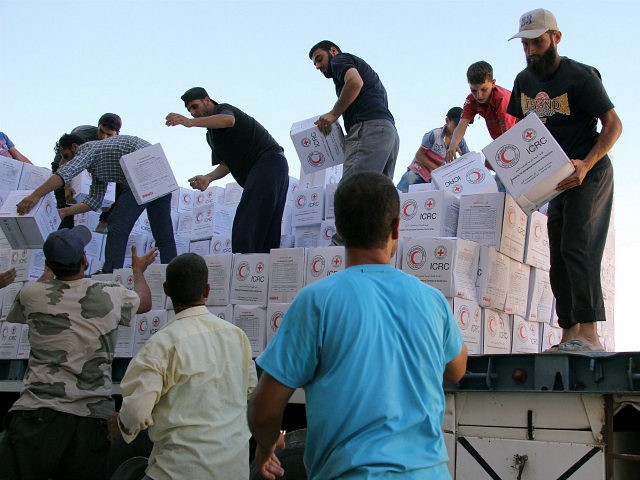73 humanitarian aid groups are dropping out of the United Nations “Whole of Syria” program, accusing the UN of cooperating too closely with the dictatorship of Bashar al-Assad. The move comes shortly after an exposé in The Guardian revealed deep financial ties between Assad and UN humanitarian projects in Syria.
“It has become clear to many organizations that the Syrian government in Damascus has a significant and substantial influence on the performance of UN agencies based in Damascus,” the organizations write in an open letter where they declare they are suspending their participation in the Whole of Syria program. Whole of Syria was meant to be an information-sharing mechanism to allow organizations to maximize their knowledge of where food and medical supplies were most needed and how best to deliver that aid.
The Guardian notes that not having this on-the-ground network of information resources will likely mean “the UN will lose sight of what is happening throughout the north of Syria and in opposition-held areas of the country, where the NGOs do most of their work.”
The organizations allege that UN agencies participated in “the blocking of aid to besieged areas, the removal of medical aid from inter-agency convoys, the disregard for needs-assessments and information coming from humanitarian actors in Syria, and the marginalization of other humanitarian actors in the critical planning phases of crisis response.”
Speaking to The Guardian, Fadi Al-Dairi, the co-founder of Hand in Hand for Syria, explained what this meant in practice. “Sometimes we would agree on reports and they would just take things off afterwards, just remove it,” he explained. “We’re mainly worried about the political pressure that the Syrian government has on the operation of the UN. As a result, when you talk about besieged areas or medical evacuations, they aren’t doing their job.”
“Many people who are in need have been completely abandoned in non-government held areas,” Dr. Ahmad Tarakji, the head of the Syrian American Medical Society (SAMS), told France 24.
“UN agencies based in Damascus and their main partner, SARC, have been making the final decisions, shaped by the political influence of the Syrian government,” they protest.
The groups are demanding an independent investigation into the ties between UN officials in Damascus as the Assad regime, whose indiscriminate bombing in rebel-held areas has caused much of the damage requiring outside humanitarian aid.
The UN says it hopes to be able to continue to “engage” with the aid agencies who no longer want to work with them, according to a statement provided to France 24.
The disengagement by independent aid agencies follows a bombshell report published in The Guardian on Thursday showing that the United Nations had funneled millions in “aid” to high-ranking Syrian government officials and members of the Assad family. Among those receiving aid were numerous officials and companies under European Union and U.S. sanctions.
“Our choices in Syria are limited by a highly insecure context where finding companies and partners who operate in besieged and hard to reach areas is extremely challenging,” a spokesman told The Guardian in August.
Another spokesman protested to Reuters that the UN had been distributing millions in aid: “People who accuse us of being ‘too close’ to one side or another have clearly not been paying attention to what we have been saying on a regular basis.”
UN Secretary General Ban Ki-Moon has previously accused Assad of “war crimes,” in particular the deliberate starvation of communities that oppose his prolonged stay in power. “Let me be clear: the use of starvation as a weapon of war is a war crime,” Ban said in January. “All sides, including the Syrian government which has the primary responsibility to protect Syrians, are committing this and other atrocious acts prohibited under international humanitarian law.”
“The impartiality of the UN’s humanitarian operations is fundamental to saving lives and our focus is squarely on reaching people in need. To achieve this, we must work with all to reach all,” Stephen O’Brien, the UN’s under-secretary general for humanitarian affairs, said in response to the Guardian report.
In addition to starving out entire communities, Assad has regularly engaged in the use of chemical weapons against civilians, banned by UN convention. In November 2015, a U.S. official told Reuters that the use of chemical weapons on the part of Damascus had become “routine.” By August, reports that Syrian warplanes were dropping chemical weapons on civilians persisted.
Last week, human rights activists on the ground reported evidence that Assad had dropped chlorine bombs over a suburb of Aleppo, a region with no significant Islamic State presence.
Assad has insisted that he is only targeting “terrorists” and teased in interviews that Western forces have been secretly supporting him, avoiding going public to not attract the ire of the United States. He has accused Washington of not being “serious” in its fight against Islamic terrorism.

COMMENTS
Please let us know if you're having issues with commenting.